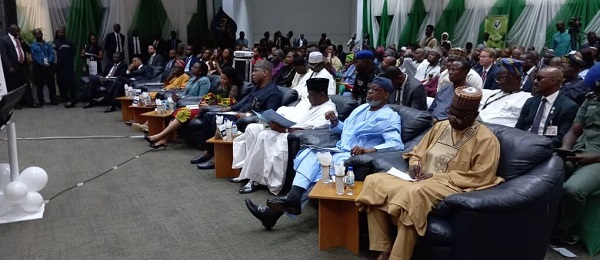
In a significant development, the Federal Government, through the Federal Ministry of Steel Development and the Federal Ministry of Solid Minerals Development, has pledged unwavering support for investors in the mining sector.
The goal, it said, is to harness the vast potential of the industry, contributing significantly to the nation’s GDP and creating employment opportunities.
President Bola Tinubu revealed this during the 8th edition of the Nigeria Mining Week, currently ongoing in Abuja. The event, organised by the Miners Association of Nigeria (MAN), VUKA Group, MSMD and PEC, is themed “Capitalising on Nigeria’s critical mineral resources for its economic growth”.
The president, represented by the Secretary to the Government of the Federation, Sen. George Akume, emphasised that the choice of this year’s theme was deliberate. It aimed to spotlight the remarkable progress being made in the mining sector, highlighting the Federal Government of Nigeria’s dedication to supporting investors in the industry and maximising its potential.
He noted that the Nigeria Mining Week served as more than just a conference and exhibition. It is a networking platform designed to showcase the vast potential of Nigeria’s mining industry to the global community.
Tinubu highlighted the establishment of the Ministry of Steel Development and the Ministry of Solid Minerals Development, reflecting the Federal Government’s resolve to unlock the mining industry’s potential and enhance its contribution to government revenue.
“The policy will ensure that the youth in the country will also be meaningfully absorbed into the economic venture, empowering them and enhancing their specialised skills. This will also serve as a source of much-needed foreign exchange for the country,” he stated. He pledged that the Nigerian government would continue to foster an enabling business environment for genuine investors to thrive in Nigeria.
While Nigeria is globally renowned for its oil and gas resources, which represent only a fraction of its energy sector potential, the narrative is shifting. The government is striving to leverage every possible resource to industrialise the country. President Tinubu remarked, “There is no reason why Nigeria, and any other African nation, should not lead in the critical mineral value chain”.
The Minister of Solid Minerals Development, Dr. Dele Alake, echoed the sentiment, emphasising that Nigeria is blessed with abundant mineral resources poised for transformation. The judicious and responsible management of these resources can drive economic growth, create employment opportunities and improve citizens’ well-being.
Nigeria’s rich resources include limestone, gold, baryte, bitumen, lead-zinc, coal and iron ore, among others. These minerals have the potential to reduce the country’s dependence on oil revenues, diversify the economic base, underpin sustainable development across various sectors, and offer significant job opportunities.
Alake emphasised that the vision for the mining sector extended beyond resource extraction. Responsible and sustainable mining operations are pivotal, and the sector should serve as a catalyst for community development, job creation, and adherence to industry best practices that minimise ecological impact.
The Ministry of Solid Minerals is resolute in advancing the mining sector in Nigeria. Efforts include addressing historical challenges such as infrastructure deficits, inadequate geological data and the imperative need for modern mining practices. The ministry is committed to improving the ease of doing business within the sector, enhancing transparency and enforcing regulations that safeguard the interests of investors, the environment, mining host communities, and gender issues.
The Minister of Steel Development, Alhaji Shuaibu Audu underlined Nigeria’s wealth of critical minerals, such as coal, tin, lead, limestone, iron ore, among others. Proper harnessing of these resources holds the key to diversifying the economy and significantly increasing revenue streams. The mining industry is poised to boost revenue, infrastructure, create jobs, attract investors and elevate the country’s GDP from 3 percent to 7 percent.
The ministry is taking steps to diversify Nigeria’s economy and attract foreign direct investment by transforming the Ajaokuta Steel Company Limited (ASCOL) complex into a Free Trade Zone. They are also designating a 24,000-hectare land in Ajaokuta as an Industrial Park, with the goal of revitalising the steel industry, generating jobs, and stimulating economic growth.
President of the Miners Association of Nigeria (MAN), Dele Ayanleke emphasised the current intense interest in the solid minerals sector, especially from lower tiers of government. MAN, along with its partners, envisions robust discussions leading to practical actions that accelerate sector growth, fostering diversification and expanding the national economic landscape.
Ayanleke called on the President to steer Nigeria toward becoming an industrialised nation. He pointed to the separation of the iron and steel component and the creation of a separate ministry to drive the steel sector’s transformation as promising signs.
The conversations are expected to yield proactive recommendations to address challenges hindering sector growth. These challenges include resource control and state interventions, insecurity, inadequate human and logistical capacities of regulatory bodies, illegality and banditry, uncontrolled involvement of foreign nationals, insufficient value addition, and the unregulated export of mineral resources. The goal is to drive sustainable development and comprehensive value addition across the mineral development value chain.

